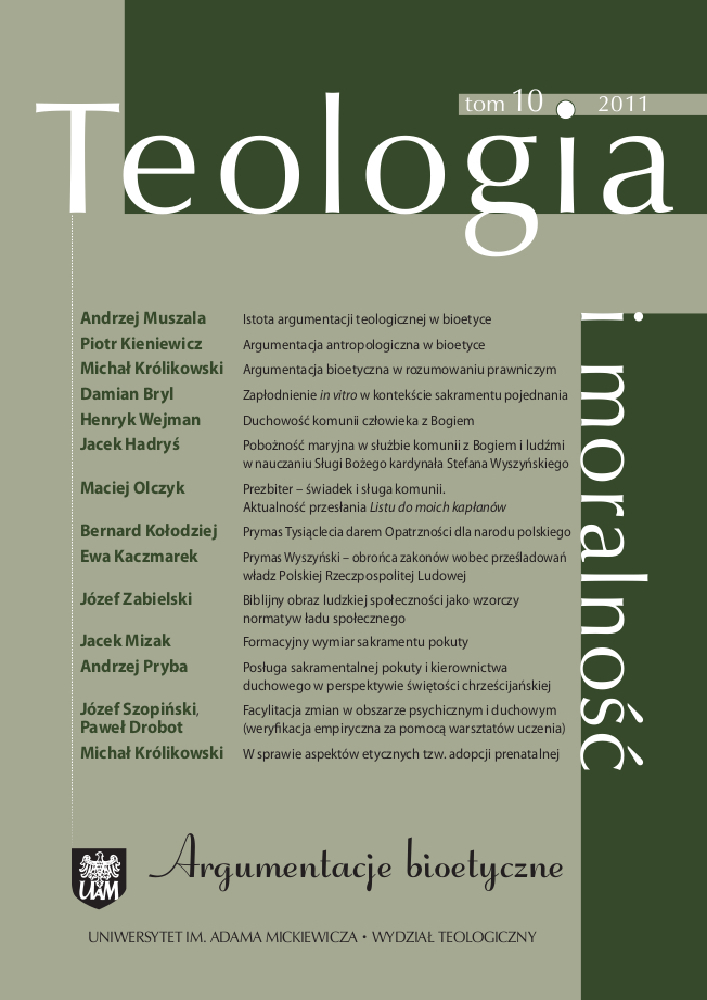Abstract
The author of the article was inspired by the reflections of Primate Stefan Wyszyński on the identity and mission of the presbyter collected in A Letter to my Priests. The book takes up a range of themes integrated by an obvious concern for the unity of priests in the service of ecclesial communion. For the Primate of the Millennium man's social nature clearly confirms the truth about man's calling to live in community, not just the temporal one, but the supernatural one as well. This natural capacity to enter into relations with others, in order to be understood correctly, must be interpreted in the light of Divine Revelation. A rich inner life allows one to contemplate the mystery of the Holy Trinity and perceive it as a source of ecclesial and interpersonal communion. The gift of supernatural power inherent in communion with God in the Church enables those who believe in Christ to forge new fraternal relations, making them a true family of God. This process occurs thanks to priestly ministry, so presbyters are especially called to illuminate their mutual relations with this new style of community life. A personal bond with God, relation with the bishop ordinary, other presbyters and the lay faithful are the basic dimensions in which priests are to appear as the witnesses and servants of communion.References
Bartnik Cz., Zarys myśli teologicznej Kardynała Stefana Wyszyńskiego, „Ateneum Kapłańskie” 436(1981)2.
Czaja A., Kościół jako komunia. Podstawowe elementy eklezjologii „communio”, w: Komisja Duszpasterstwa Konferencji Episkopatu Polski, W komunii z Bogiem. Kościół domem i szkołą komunii. Program duszpasterski Kościoła w Polsce na lata 2010-2013, Poznań 2010.
Czuba K., Rola kapłanów w życiu Kościoła i Narodu w nauczaniu Prymasa Stefana Wyszyńskiego, „Studia Prymasowskie” 4 (2010).
Dyr A., Kapłaństwo hierarchiczne w myśli teologicznej Kardynała Stefana Wyszyńskiego, „Communio” 123(2001)3.
Ewartowska J., Boże Ojcostwo wewnętrzną zasadą refleksji teologicznej Prymasa Stefana Wyszyńskiego, „Collectanea Theologica” 71 (2001) 4.
Macko W.R., Znaczenie modlitwy dla posługi i życia kapłańskiego w nauczaniu Kard. Stefana Wyszyńskiego, „Collectanea Theologica” 76(2006)3.
Ozorowski M., Kościół jako wspólnota w nauczaniu Prymasa Stefana Kardynała Wyszyńskiego, „Studia Prymasowskie” 1(2007).
Pius XII, Mystici Corporis Christi.
Plaskacz M., Rastawicka A., Wojdecki M., Człowiek niezwykłej miary. Ojciec Święty Jan Paweł II o kardynale Stefanie Wyszyńskim. Kardynał Stefan Wyszyński o sobie. Kardynał Józef Glemp o kardynale Stefanie Wyszyńskim, Warszawa 1984.
Poniński A., Realista i prorok. Zarys poglądów Ks. Stefana Wyszyńskiego na socjalizm i komunizm, „Ateneum Kapłańskie” 553 (2001).
Przedmowa w: S. Wyszyński, List do moich kapłanów, cz. 1: Wspólnie z Trójcą Świętą, Paryż 1969.
Sobór Watykański II Lumen Pentium.
Sobór Watykański II, Dei verbum.
Sobór Watykański II, Gaudium et spes.
Sobór Watykański II, Lumen Pentium.
Waleńdzik P., Obrzędy święceń drogą do świętości w świetle wypowiedzi Kardynała Stefana Wyszyńskiego, „Studia Prymasowskie” 4 (2010).
Werbiński I., Duchowość współczesnego kapłana w świetle przemyśleń Sługi Bożego Kard. Stefana Wyszyńskiego, „Ateneum Kapłańskie” 147 (2006) 3.
Wyszyński S., List do moich kapłanów, cz. 2: Wspólnie z Kościołem, Paryż 1969.
License
All rights reserved
